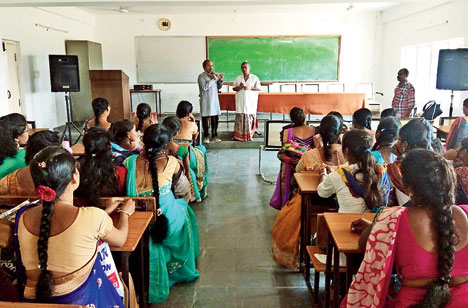
New Delhi: Thrice a week, Kameshwari Vinjamuri rides into villages in Telangana's Yadadri-Bhuvanagiri district and speaks to local women, urging them to protect their uteruses from scalpels.
Kameshwari, a gynaecologist who on other days practises in Hyderabad, tells the women what specific medical conditions warrant a hysterectomy and when the removal of the uterus is unnecessary.
Since January, Kameshwari and her husband Surya Prakash Vinjamuri, also a medic, have conducted 45 such lecture sessions. They are hoping their message will by December reach all the district's estimated 200,000 women of reproductive age.
Their campaign, supported by the Telangana state health department, is aimed at curbing what many doctors believe is a nationwide trend of needless hysterectomies on young women.
The suspicion is that the expanded reach of health insurance, among other factors, is driving such practices by doctors for financial gains.
"For all of us, the uterus is our first home; we should protect it. That's how we often start our talks, but there are many medical reasons why unnecessary hysterectomies should never be done," Kameshwari said.
A study by the Indian Institute of Health Management Research in Jaipur, published this year, used district-level household surveys to document wide variations in hysterectomy rates - from a low two per 1,000 ever-married women to 63 per 1000 ever-married women.
"Telangana and Andhra Pradesh appear to be hotspots for hysterectomy," IIHMR researchers Ranjan Prusty, Chetan Choitani and Shiv Dutt Gupta said in the study, published in the journal Reproductive Health.
Earlier studies in some districts in these states had suggested that poor rural women were being coerced into hysterectomy even for routine gynaecological complaints such as abdominal pain or white discharge, a practice likely driven by profit motives.
The 2018 study indicated that women from households that had health insurance were likelier to undergo hysterectomy than women from non-insured households.
The Vinjamuris say their concerns about unnecessary hysterectomies arose from a meeting with women workers at a factory in Andhra Pradesh in 2001. Almost all the 300 women workers reported having had hysterectomy.
This prompted the couple to visit villages around Hyderabad. They found many women in their 20s, 30s and 40s experiencing health problems often associated with hysterectomy, such as early menopause and bone-thinning.
"There are clear indications for hysterectomy: uterine or cervical cancer, ovarian cancer, fallopian cancer, endometrial hyperplasia, uterine fibroids that push beyond a 12-week gestation size, uterine bleeding that is unresponsive to other lines of treatment," said Kameshwari.
But the couple have found women who were prescribed unjustified hysterectomy for discharge, pain in the lower abdomen, spotting and menstrual irregularities and even non-uterine complaints.
In August 2017, the Vinjamuris released a book in Telugu urging women to protect their uterus.
Last December, a senior state official, Vakati Karuna, invited them for a chat and asked them whether they would like to spread their message across the Yadadri-Bhuvanagiri district.
"We do this out of pain," said Prakash. "A medical procedure intended to save lives is being abused."










